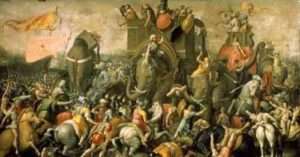The Tenth Day
At dawn on the tenth day, Bhishma got up in a happy mood: not many days would pass and he, after such a long time, would return to his celestial planet, to his mate and his brothers. He was so peaceful and happy that everyone noticed him.
Arjuna’s state of mind was quite different: he thought it was terrible what he would have to do soon.
The attack on the Kaurava armies was led, from the early hours, by the brave warrior Shikhandi, sword in hand, ready at any moment to lash out at the hated elder of the rival house. Immediately behind him were Arjuna and Bhima. Abhimanyu and the sons of Draupadi followed, and then Satyaki, Dhristadyumna, Yudhisthira and the Pandava twins. The rest of the army, led by Virata and Drupada, was slightly behind. From that arrangement everyone could understand that the intended purpose for that day was to end the life of Bhishma.
On the other side, as always, Bhishma was in the front line, followed by Drona, Asvatthama, Bhagadatta, Kritavarma, Kripa and all the others, each of whom was escorted by their respective army. The sound of the horns announced the start of hostilities.
That morning it quickly became apparent that Nakula and Satyaki were particularly inspired in combat. Bhishma was not to be outdone; indeed, he seemed to arouse general admiration even more than usual. However, those who knew him well distinctly noticed something anomalous in him: his expression was not the usual one, he was more serene, he even seemed happy.
Shikhandi immediately attacked him, but for the umpteenth time Bhishma refused to accept the challenge, stating that he would never fight against a woman. Again humiliated, Shikhandi vented his fury against his hated enemy. He hit him repeatedly without being able to get any reaction. At that juncture Arjuna arrived.
“Keep hitting him even if he refuses to fight,” he yelled at him in the clamor of battle. “Don’t leave him for a moment.”
At that moment many great warriors rushed to protect Bhishma from the son of Drupada; but Arjuna rejected them all. From the early hours of that day, when they had seen Shikhandi on the front line, everyone had understood the intentions of the Pandavas; and now that incredible frenzy around Bhishma only confirmed to Duryodhana that their commander was in great danger. The Kaurava managed to reach him.
“Arjuna is burning our army like an immense fire,” he shouted, “and his son Abhimanyu and Bhima are also making us suffer terribly. You are our only hope: protect us.”
“From the beginning I told you that I would not kill Pandu’s sons,” he replied in a harsh tone, “and I promised you that every day I would eliminate ten thousand of your enemies. Today I have almost completed the number; my debt is paid to you. But by now I am tired of killing, I no longer want to stain myself with more innocent blood just to satisfy your whims. Moreover, the Pandavas cannot be killed even by the Devas. Today I will fall on the ground wounded to death, and I really hope that at least that will bring you back to your common sense again.”
With no desire to argue further, Bhishma returned to focus on the fighting.
Meanwhile, great direct duels raged throughout the camp, such as that between Arjuna and Duhssasana, between Bhima and Bhurisrava, between Alambusha and Satyaki, and many others. In the struggle waged between Alambusha and Satyaki, Bhagadatta had to intervene to save the life of the Rakshasa, who had been put in serious trouble by the Vrishni. And also around that duel, a great uproar arose when Duryodhana sent other generals to help Bhagadatta. But Satyaki, who was Krishna’s close friend and Arjuna’s favorite disciple, did not tremble for a moment and continued to sow terror and death. Further on, Sahadeva was inflicting a bad defeat on the acarya Kripa.
Meanwhile Asvatthama and Drona had stopped; terrible omens had warned them: something infinitely unpleasant was about to happen. That combination of Arjuna, Bhima and Shikhandi at the head of the line-up did not bode well. It didn’t take a lot of effort to figure out what their intentions were. Asvatthama immediately joined Bhishma in an attempt to protect him.
This is a section of the book “Maha-bharata, Vol. 2”.
To buy the complete book, click above
Post view 291 times




Leave a Reply